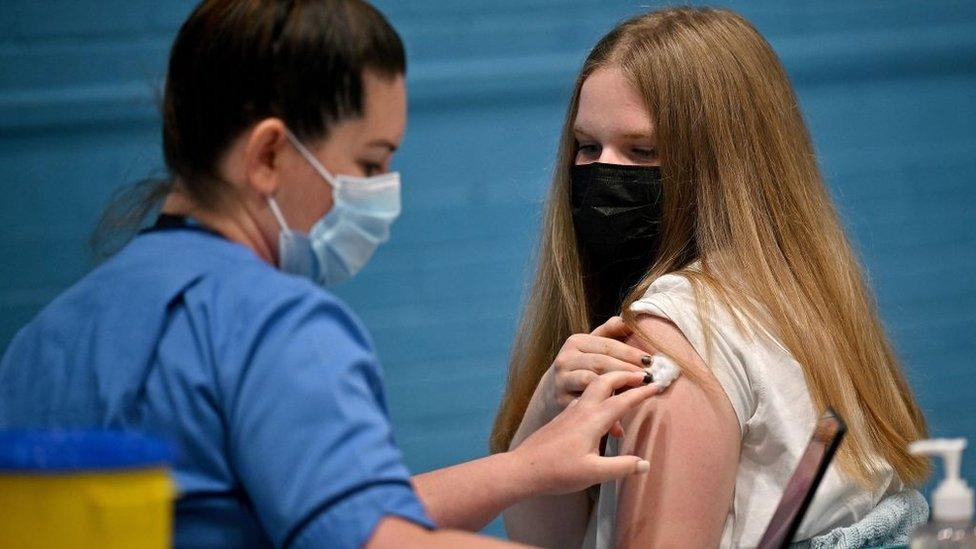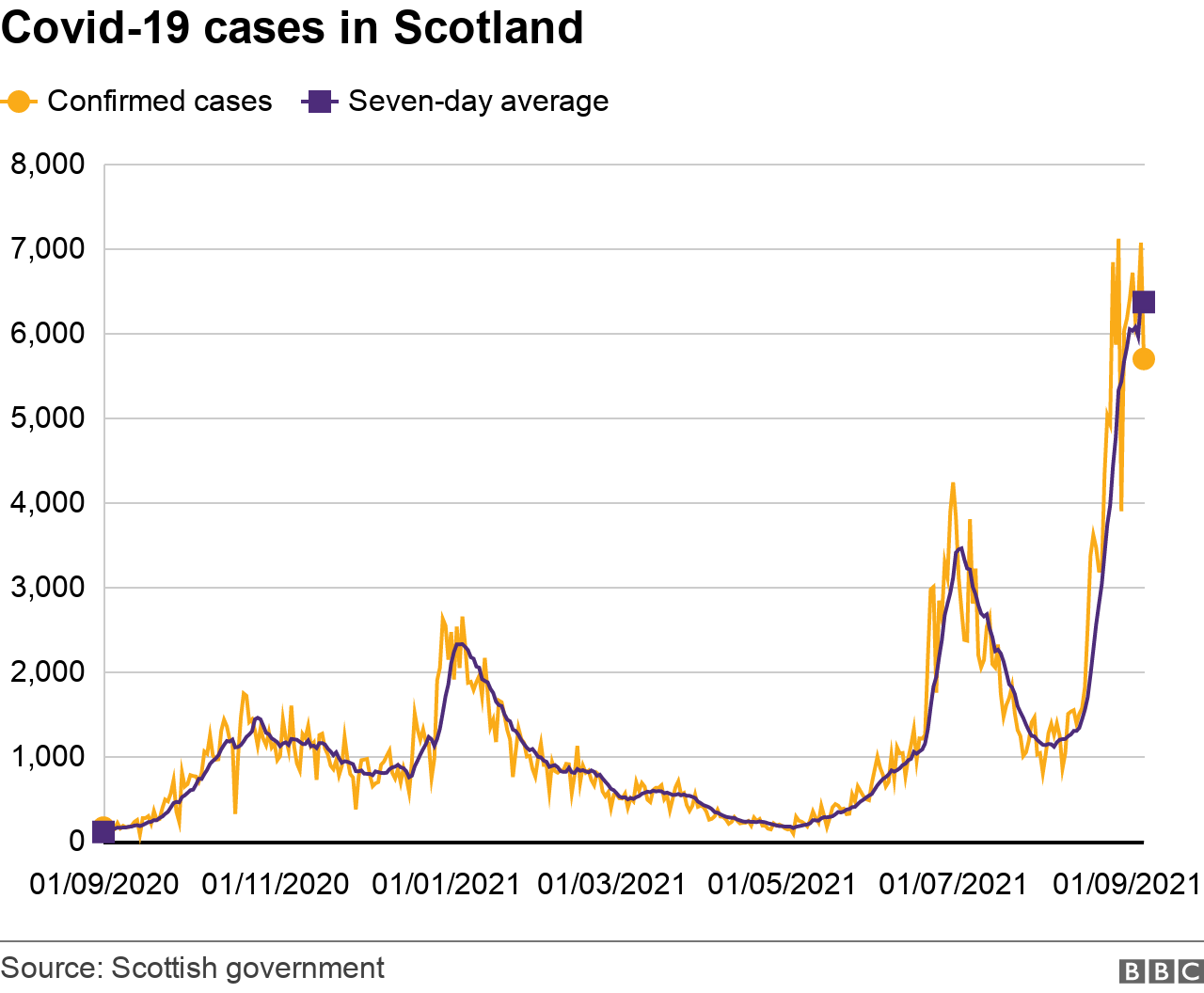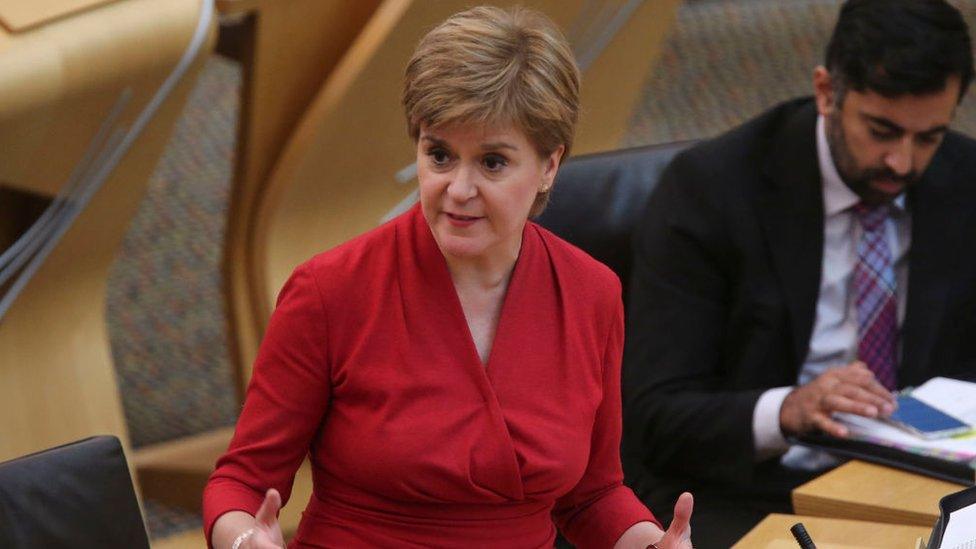Covid in Scotland: Surge in cases 'may be slowing down'
- Published
- comments

Nicola Sturgeon said the government is continuing to reach out to younger people to encourage them to get vaccinated
The rate at which Covid-19 is spreading in Scotland may now be slowing down, Nicola Sturgeon has said.
The first minister said there continued to be a very high level of infection among the Scottish population.
However she said she was hopeful that no new restrictions would be needed to control the recent surge in cases.
Meanwhile, the Scottish government is to publish a paper detailing how its plans for vaccine passports would work, ahead of a vote by MSPs on Thursday.
Opposition parties were critical of the plans, saying there had not been enough engagement with businesses which will be affected.
A further 5,810 positive cases of the virus were reported on Tuesday, accounting for 10.8% of all tests carried out in Scotland.
The number of people in hospital has risen by 78 to 883, while 82 patients are in intensive care - and 17 more deaths have been reported of people who had recently tested positive.
Ms Sturgeon told MSPs that Scotland was clearly still experiencing a surge in cases, with "very high" levels of infection.
But she said the latest figures offered "some early, albeit tentative at this stage, indication that the rate of increase may now be slowing down".
The first minister said average daily case numbers had gone up by 9% over the past week - but this was down significantly on the 70% increase seen the week before.
And she said the percentage of tests coming back positive had fallen back "slightly" from a peak of 13.4% on 29 August.
Ms Sturgeon added: "We continue to hope - and recent data gives us a bit more of a solid basis for this - we can turn the corner through continued care and caution and stringent compliance with existing mitigations and without having to reintroduce any tighter restrictions."

Meanwhile, 4,130,841 people in Scotland have had a first dose of a Covid-19 vaccine, while 3,749,767 have had both doses.
A total of 95% of people over the age of 40 have been fully vaccinated, while the figure drops to 72% for 30 to 39-year-olds and 57% for 18 to 19-year-olds.
Ms Sturgeon said the government would "continue to do everything we can to encourage more and more people to get their jag", and had written to all 16 and 17-year-olds who have not had the vaccine to offer them appointments.
The first minister also said she hoped to have advice from the UK's chief medical officers about whether or not vaccination can be offered to 12 to 15-year-olds in the coming days.
And she said her government would publish a paper setting out the broad terms of plans for vaccine certification scheme for entry to some venues such as night clubs and many major sporting events and concerts.
MSPs will vote on the plans on Thursday, and Ms Sturgeon said Scotland was "far from alone in considering such a scheme", with other countries having gone further.
She added: "In the Scottish government's view, Covid certification is a reasonable response to a very difficult situation, and much more proportionate than any likely alternatives.
"Fundamentally, we believe that certification can help us reduce the overall harms caused by the pandemic. It will help to reduce transmission in some higher risk settings, and it will maximise protection against serious illness."

Ms Sturgeon clashed with opposition leaders about plans for vaccine passports following her statement
Scottish Conservative leader Douglas Ross said it was "not good enough" that the vaccine passport plans were only being published hours before MSPs vote on them.
He said: "We need specifics,but we don't have them. We don't know how the scheme will be administered or enforced, we don't know if the data concerns have been fixed or fraud risks even been identified
"We don't know what infrastructure will be needed, or if the SNP will rule out extending them indefinitely or rolling them out to other venues at short notice."
Ms Sturgeon said Mr Ross was seeking "justification for the ridiculous position he is going to end up in" by opposing a scheme in Scotland which the UK government may also introduce for England.
Scottish Labour's Anas Sarwar has also been critical of the vaccine passport plans, and said "there is still limited engagement with business about the details of the programme and how it will work in practice".
He also said Ms Sturgeon was "hiding behind" praise for Test and Protect staff rather than resourcing the system properly.